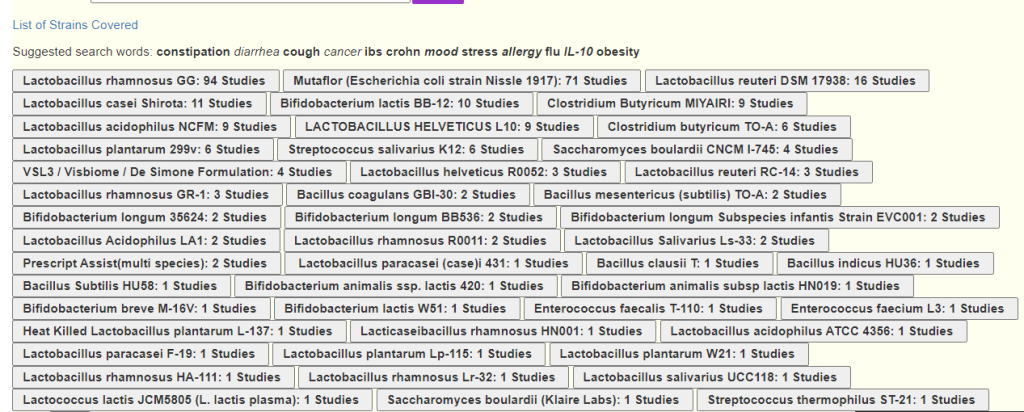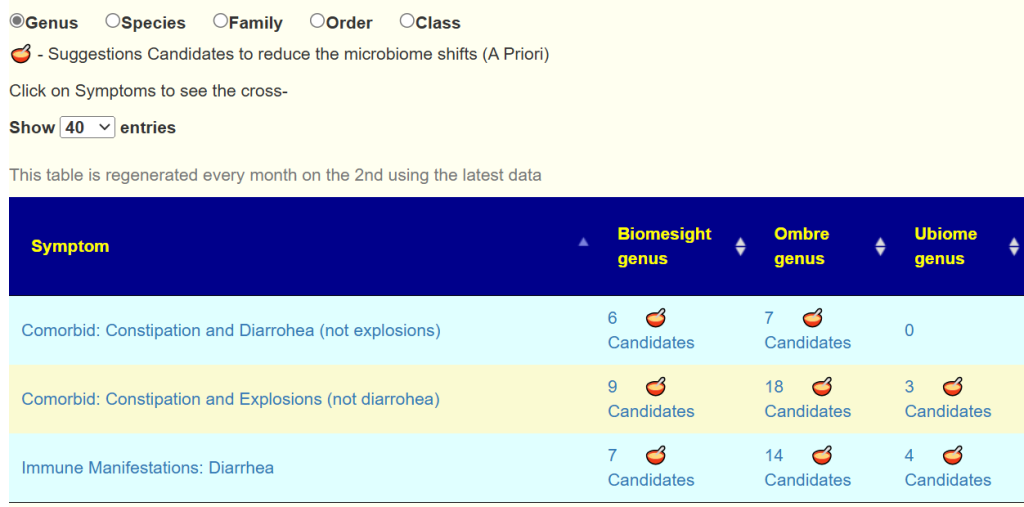A reader wrote:
Hi Ken – I’m attempting to use MBP. I recall you linked (a long time ago) to a section that showed a list of probiotics useful in colitis, with each probiotic having the studies. How would I arrive to that page?
Where do I get the probiotics?
I prefer single species — and where I get mine?
- Single species with (almost) no fillers. There are precisely three sources that I use:
- Custom Probiotics :they list all of their strains — many are researched on the above list. No other ingredients just the bacteria.
- Maple Life Science™: No strains yet, but shipments usually have manufactured date within 4 weeks of arrival (i.e. FRESH). Contains FOS
- Bulk Probiotics: US based Newbie — but has some species not available at the other two sites. No other ingredients just the bacteria. Specifically, Lactobacillus Jensenii that has great potential for Crohn’s disease.
- NOTE: none of these sell though retail outlets. This keeps their costs down and their product fresh.
There is a multiple step/layer approach that I would use. The sequence is below:
#1 Researched Probiotics Available Retail
Go to https://microbiomeprescription.com/library/ProbioticSearch and type in the name of the condition.

You will see the list of probiotics with the ones with the most studies listed first.

Below it are the links to the studies. You should read at least some of them – some may report “no effect”. The list is generated by a data gathering algorithm on the species and the condition and the condition may be mentioned in passing and not directly referenced or tested.

#2 Use Perplexity AI
Go to https://www.perplexity.ai and just ask “What is the most effective probiotic for…”. I use this AI because it provided links to data sources so I can verify the response

A typical response is below

#3 Probiotic Via Published Microbiome Shifts
In this case we are using the MP engine to generate suggestions. It is inferior in reliability to the above methods but is a reasonable fall back. Go to Medical Conditions with Microbiome Shifts from US National Library of Medicine ( https://microbiomeprescription.com/Library/PubMed ) and search for the condition

You can click the PDF download (which report TOP items only) or click Candidates (all items)

Surprise, surprise! #1 and #2 agree with Perplexity!!! vsl#3 is not listed because we do not have strain information for this mixture of probiotics. Remember – these are computed SOLELY from the microbiome shifts without reference to any studies on ulcerative colitis!
#4 Probiotic via Citizen Science
Goto Symptoms associated with conditions reported for Samples https://microbiomeprescription.com/Library/Symptoms Enter the name — in this case it was not found (not enough samples that people have annotated with ulcerative colitis). In that case, you may want to go over to symptoms you have; for example Diarrhea. This data is conditioned on the lab that the contributor was using and layered by taxa level.

I will be adding a suggestions icon to this page shortly, and you can then review those suggestions. Clicking on the bowl, produces suggestions that can be filtered to probiotics.

#1 and #2 above are #1 and #3 with the most studied one show in above!

Clicking on the symptom name takes you to the symptom page listing all of the bacteria

This will then use the expert system to generate suggestions which can be filtered to probiotics

This is ranked not by the number of studies published but by the ones with the greatest estimated impact by the expert system. We see Mutaflor, L. rhamnosus – and many familiar ones in the researched strain list.
Bottom Line
We have 4 ways of selecting probiotics. For the specific question asked, all 4 converge to the same items. In terms of clinical use, we see that the suggestions based solely on bacteria shifts going through the expert system appear to be cross-validated. IMHO, this explicit expert system works better than the typical MD would.
Recent Comments